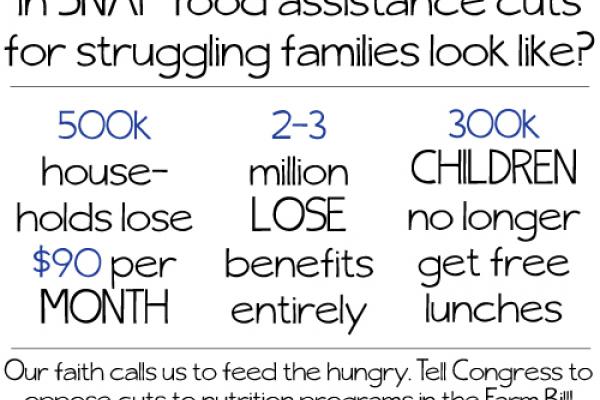On Wednesday, the House Agriculture Committee failed to reign in the deep cuts proposed to nutrition assistance programs. By 35-11, the committee voted to slash $16 billion from food stamps that 46 million Americans rely on.
Children fall behind in school when they’re too hungry to concentrate. This move means around 300,000 or so of them won’t have access to free school lunches. It means the 2-3 million who lose access to food stamps will have to cut back in housing, in childcare, in gas to afford basic necessities like milk and bread.
A common rationalization those in religious circles make for cutting social programs that help the poor is that the church should be the one helping “the least of these,” not the government. But if we know that’s not possible given the church’s means, that millions will get left behind because our efforts fall far too short, is that still a logical line of defense? Jesus told us to care for the poor, sick, and vulnerable—he didn’t prescribe how.
Sometimes Jesus healed people one-on-one. Sometimes he addressed the needs of a multitude by providing enough food to feed them all. Sometimes he sent others in his stead to provide healing.
If we ignore the needy in our midst by getting rid of one huge way to address that need, we are not following Jesus’ example.
Those who argue that the Church should be a chief provider of grace to the poor aren’t wrong about our call to serve. But they are overly idealistic. It’s like saying the government shouldn’t fund prisons or police, because the Biblical ideal is a just society free from sin and violence.
The unfortunate reality is that churches were hit just as hard by the recession as other institutions. Attendance is dwindling, as are the funds making it into the offering plate. With what they have, churches and religious organizations are working hard to provide for their communities. But let’s get real when we propose that they alone can take care of the need.
On Tuesday, Sojourners was on hand as representatives from Congress and social justice organizations voiced their opposition to cutting SNAP funding. Rev. Gary Cook, director of church relations for Bread for the World, spoke from his experience as a pastor working with churches.
“Every day churches are working hard to put food on the tables of people who are hungry. Food collections, food pantries, support for soup kitchens—all of that work that we do amounts to about 5 percent of what the federal programs are able to put on the table. When you start cutting those federal programs, you’re talking about almost wiping out the work of the churches and the effect of that work.”
Cutting billions—not millions, billions—from food assistance programs is a whole lot of money for the church to make up. It’s not going to happen. And that means hundreds of thousands of children will go hungry—in our own cities, neighborhoods, schools.
In an ideal world—the one that many Christians tout when they make these arguments—a lot of things would be different. The church would have the capacity to help all of those struggling in poverty—and those that fell into it, hard-hit by the recession. But that also assumes a world in which all people go to church and tithe 10 percent of their income.
We don’t live in that world, so let’s try to make the best of the one we’ve got.
Sandi Villarreal is Associate Web Editor at Sojourners. You can follow her on Twitter @Sandi.
Got something to say about what you're reading? We value your feedback!
